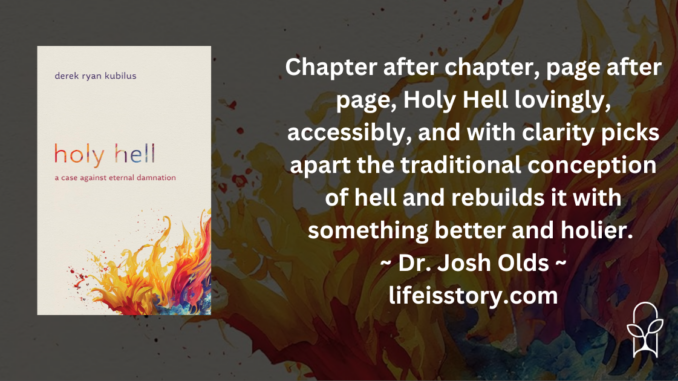
Published by Eerdmans on February 27, 2024
Genres: Non-Fiction, Theology
Buy on Amazon
Goodreads

What if everything we’ve heard about hell is wrong?
Eternal torment. A lake of fire. Wailing and gnashing of teeth. Many of us have sat through enough sermons to know what awaits us if we slip up. These dark visions of the afterlife seem a bit sadistic. Is there any hope within the Christian faith if this is the God of Love we serve?
In this lively debut, Derek Ryan Kubilus makes the case for universal salvation. Kubilus shows how our ideas about hell have been distorted by mistranslation of the Greek and Hebrew Scriptures. Armed with proof-texts, those in power have used threats of eternal damnation as an instrument of control. Arguing that such torture is contrary to God’s nature, Kubilus offers an alternative understanding of hell—a temporary and holy rehabilitation, reconciling all creation in Christ.
Theologically serious and culturally engaged, Holy Hell will shake readers’ assumptions about a seemingly implacable Christian doctrine that chains so many to eternal dread. In its place, Kubilus offers a vision for a church that serves all people with compassion, wherever they are in their journey toward Christ.
Over the past several years, I’ve been deconstructing. Not because I wanted to be trendy. Not even necessarily because I found myself hurt by the church—which has been the case for so many that I know and love. Rather, my shifting beliefs came from a realization that the construct of faith into which I had been birthed was much smaller than the expansive, all-encompassing love of God. I tore down walls to find a bigger, beautiful, flourishing community. But I’ve never really known what to do about hell.
Slowly, I moved from “turn or burn” to a better understanding of fire imagery as metaphor, and eventually coming to a place where I saw Hell as the “loving” option—that God was providing a place for all those who would not accept their love, and if that was described with such terrible imagery then maybe that’s because not accepting the love of God is truly a terrible thing.
It was Ted Dekker who started to shake me out of that place of stasis. A fiction writer, Dekker wrote a trilogy of fantasy books that were a beautiful allegory of redemptive history. Some years later, amidst his own changing theology, he penned a fourth book—one that saw even the most irredeemable become redeemed. Later books, expanding on the series, made the themes of universalism even more clear.
But what I could not shake was this question of free will. How can a loving God force people into heaven? How can there be universalism when following God is a free choice? This wasn’t the only question I had, but it was the heart of it. With Holy Hell: A Case Against Eternal Damnation, Derek Ryan Kubilus provided me with all the answers I’d been wanting.
Kubilus argues unequivocally that eternal conscious torment is antithetical to the nature of God. He doesn’t just say that the portrayal of hell is metaphorical or that it’s influenced by Dante. Instead, he argues from a higher authority—we must be interpreting this wrong because the overwhelming evidence suggests that God is not like this. From there, he begins to deconstruct the idea of eternal conscious torment.
Holy Hell begins with the text. The problem is that when our English Bibles use the word “hell,” we import the imagery of our evangelical teaching. Kubilus suggests—and proves rather definitively, in my opinion—that when the Bible uses the words translated “hell” in English, it has something much different in mind. One of the most powerful things I realized from this was that the purpose of “fire and brimstone” wasn’t to destroy, but to refine. Gold put into the fire has all its impurities melt away. This firey version of hell isn’t about damnation, but redemption!
Chapter after chapter, page after page, Holy Hell lovingly, accessibly, and with clarity picks apart the traditional conception of hell and rebuilds it with something better, something holier. And Kubilus doesn’t chuck out Scripture to do so! Rather, he shows that a faithful, contextual reading of Scripture can also lead to this understanding of hell. Kubilus strongly makes the case that “hell” is redemptive, that God’s Kingdom community is for everyone, and that we don’t need to live in fear of separation from God.
For me, this was a paradigm-shifting book. Maybe it will be for you as well.
